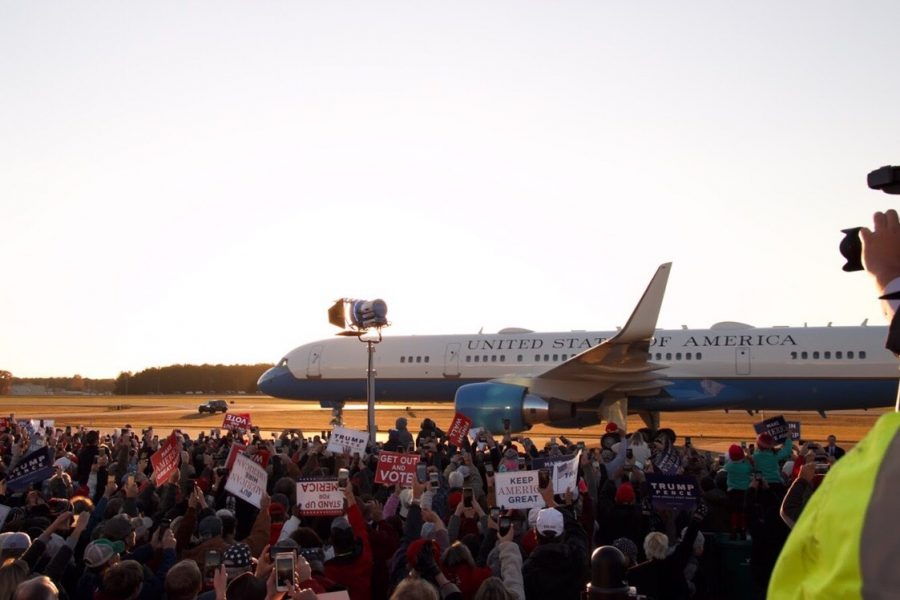What I Learned from Getting Booed at a Trump Rally
January 28, 2019
After attending the presidential rally in Tupelo, Mississippi, Nov. 26, The Vision editors emerged with their ‘visions’ both transformed and verified based on their experience. Read about Opinion Editor Timothy Lewis, News Editor Brady Suttles and Editor-in-Chief Helen Peng’s separate opinions on their experience.
Timothy Lewis:
I came to the rally in Tupelo with a hopeful, optimistic outlook; however, my experience there only ended up confirming most of the beliefs I already held about the supporters of President Trump. I completely expected some of the bigger liberal news outlets like CNN and NBC to be ridiculed, but I was caught a bit off guard by Trump calling out the entire media box as being “fake news.” I also was rather saddened by the clear mob mentality taking hold: the classic “us” versus “them,” the “them” ranging anywhere from members of the media to anyone with a different skin color than the almost entirely homogenous white crowd. It was honestly sort of funny-yet-sobering in a dark way to play the game of “spot the minority”; I think I only counted about six people who weren’t white enough to be able to blend in with snow.
I was also taken aback with the audacity with which the president–the highest office in America–could make bald-faced lies and still have his audience eat them up. For example, I almost burst out laughing at the absurdity of President Trump painting the Democratic Party, and Mike Espy by extension, as “radical socialists”; as a leftist, no socialist even approaches liking the Democratic Party. Trump also used the tried-and-true fascist trick of painting the enemy as both weak and strong, terrifying in strength yet also powerless in the face of his supporters’ wrath and support; he repeatedly characterized immigrants from Mexico as an unstoppable force of violent rapists and murderers while also proclaiming that he had stopped their immigration as a result of his stringent border policies.
This rally, however, was not a complete waste of time. It taught me not to judge books entirely by their covers: one woman we interviewed who looked like a walking southern stereotype actually said that she was against Cindy Hyde-Smith because she was a racist. I also learned how to parse fascist dog whistles and euphemisms a bit better by listening to Trump’s (sometimes thinly) veiled racist comments against Espy and South American immigrants to the United States.
Brady Suttles:
As both a journalist and Republican, I found myself on conflicting sides of an argument that should not exist.
When I found out I was going to have the opportunity to go to the Trump rally and cover the event, I was ecstatic. However, from the moment I arrived in Tupelo, the animosity of the people and their overall emotions transformed my beliefs and quickly turned my patriotic fervor into complete shame. In that moment, I was no longer proud to be a Republican.
From the moment we stepped into the press box, the onslaught of attacks from the supporters began. But this nowhere near came close to the astonishment and rejection I immediately received from my president. One of his opening statements was a blatant attack on the media where, pointing directly at us, titled us as the “fake news media.”
In the moments that I saw President Trump land in Air Force One and militarily walk down the steps of the plane, patriotism swelled up inside me. But my flames of patriotism were quickly extinguished as he opened his mouth, inciting his fervent attacks.
This left me questioning why he would do this, as most of the local media outlets, being from a strong red state, were most likely Republicans anyways. Why would Trump attack his own people, his own supporters? Although it is the responsibility of a journalist to be fair and report the utmost truth, each individual has their own morals and party affiliations that I would undoubtedly say, for the local journalists covering the rally, lean right.
The overall atmosphere of hate and blame in the crowd neither supported a national unity or respect for one’s country. It felt as if the supporters were there to applaud the criticism of past administrations, past Democratic administrations to be precise. Sure, every administration makes mistakes, but those mistakes are not what the president should blame for the country’s state, a state that he has promised to return to greatness.
Trump has been in office roughly two years and in those two has not fulfilled two of his main promises: abolishing the Affordable Health Care Act (Obamacare) or building a wall along the southern border funded by Mexico. Quite ironic, seeing as how two large signs hung behind him with the quote “Promises Made, Promises Kept.”
Although the experience only strengthened my wishes to pursue journalism, I walked out of the event differently than I came in. As we departed Tupelo en route to Columbus, I began to question if I was even Republican anymore. I began to think if all my party has to offer me is an overall atmosphere of hate, blame, intolerance and unkept promises, is it really the party I want to be affiliated with? Are these the people I want to vote alongside in the 2020 election to put Donald Trump in office yet again? It made me think if voting party lines are the only reason one votes for a candidate, then does anyone’s voice matter?
Helen Peng:
After having the opportunity to cover the presidential rally in Mississippi, I have realized the tremendous respect we owe to journalists. After registering for and getting our press passes approved, the editors and I felt a sense of excitement and responsibility to cover such an important event in our home state, especially after Hyde-Smith’s controversial comments trivializing public hangings. Although I was aware of the certain danger we had put ourselves in as journalists in an environment where the “fourth estate”–journalists like us–is not valued, I did not realize the extent to which hatred was directed towards the reporting of the truth or the impact it would have on me.
During the rally, President Trump targeted the media and press, referring to us as “fake news” and claiming that “if we had [the media] back a little further, we’d have the people here with us.” Soon after, the crowd starting booing us. Even during the remainder of Trump’s speech, angry insults were thrown at us, advising us to move out of the way or telling us that “chairs are for sitting” as we stood on them to get media coverage of the rally. In addition, while President Trump began to discuss his economic policies, he specifically antagonized China, almost painting China as an unethical powerhouse stealing away American jobs and industry. As one of the only ethnically Chinese people present at the rally, I saw many eyes turn to me, staring.
I have never felt a mixture of fear and determination as strong as when my fellow Mississippians—friends’ parents and neighbors—rose in support of denouncing a group of people dedicated towards celebrating the First Amendment and truth. While I admit the press is not perfect, and though perhaps has become more polarized with political turbulence, this experience has only further ignited my passion for journalism and pride for the journalists who continue to report the truth today. I also learned to never take for granted our freedom of speech, as it gives us the power to support our rights and to stay curious, critical, courageous and truthful.









